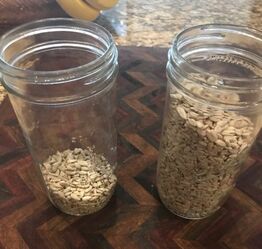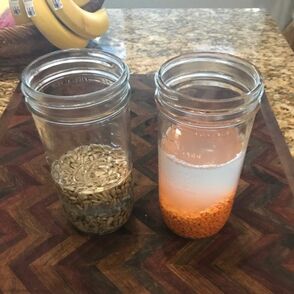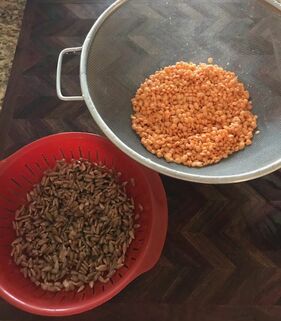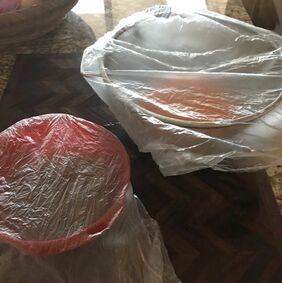|
Sprouting seeds and legumes is a great way to bring added nutrients to your diet. Sprouted seeds or legumes are enzymatically active protein sources that require little digestion. They also pack a lot of flavor. My two favorites are pictured below. Sunflower seeds and lentils, which come in many varieties and sized. Lentils have a peppery taste and can be easily made into a homemade hummus. Chickpeas aka, garbanzo beans are also excellent sprouted in the same way detailed below. I personally don't care much for alfalfa, radish, mung bean as I find them bitter. Although those with a Pitta constitution benefit from these bitter foods. Below you will find a list of "sprout'able" seeds, legumes and nuts. You can also sprout grains, but again, I am not a big grain eater so I don't. I have tried sprouting rice many times with no success, so I just don't bother with that! I have found what I like and so will you as you experiment with the options Over the years I have tried all kinds of sprouters and have found that low tech is the best way to go!  Here I'm preparing to sprout sunflower seeds. I keep my seeds in Mason jars in the frig or freezer, as here in Arizona it gets quite hot. Nuts and seeds can go rancid with exposure to heat and should be kept in cool dark storage. Don't sprout more than you will consume in approximately 3-4 days. Beyond that time they can get slimy, which means bacterial growth. No good!  You will notice in the picture that I have added enough water to cover the sun seeds plus about 1" more. The lentils have more added water. This due to the fact that they will absorb more water than the sun seeds. You will soak the sun seeds for only a couple of hours Whereas the lentils require at least 4-6 hours of soaking for this small variety. Larger lentils and some of the smaller dense lentils need to soak over night. I've made those notes below with the list of sprout'ables.  Once your seeds or legumes are soaked place them in a colander or sieve . I have several various sizes of colanders and sieves to accommodate my favorites to sprout. Make sure the the opening in the sieves are small enough that your seeds or legumes will not fall through them. Rinse them throughly after soaking. Once they are well rinsed place a plastic grocery bag or large zip lock over the colander or sieve.  You do not want to seal or twist tight the bags. The environment for sprouting needs to be able to "breath" allowing air to circulate and not stagnant which can allow for fungus or bacteria to grow on your sprouting seeds or legumes. You will then rinse the sprouting sprouts 2 -3 times daily. Sprout times vary with density of the seeds or legumes. In the case of these two sprouts, the sun seeds only need one day to start showing their shoots, the lentil take two days or so. Refer to the info below for approximate sprout times for each sprout'able listed. It's a good idea to finish off your sprouts with a quick hydrogen peroxide rinse to kill any unfriendly bacteria that may have found a home on them. Simply place them in a bowl and pour 3% hydrogen peroxide, enough to barely cover them, allow to sit for a few minutes and then rinse.  A great source for Sprout'able's! A great source for Sprout'able's! Almonds sprout nicely giving them a fragrant taste and delightful snappy crunch Soak over night, sprout for 1 -2 days. Other nuts such as pecans, walnuts, Brazil nuts tend to get bitter when soaked and do not sprout. Pumpkin seeds fall into this category as well. They take on a bitter almost metallic taste when soaked or sprouted. Garbanzo beans make an awesome raw hummus and are delicious on salads Soak for 24 hours, changing the water at least two times. Sprout until the tails of the shoots start to show up. Soak in hydrogen peroxide before using. Mung bean and adzuki beans are very dense. Soak for up to 48 hours changing the water two times per day. Sprouting time will vary with the temperatures, but generally 3 - 4 days. Soak in hydrogen peroxide before using. Peas also make a great sprout. Follow the same directions as the garbanzos, however you can actually let the peas start to grow to their leafy stage. Just make sure to rinse often and watch for fungus. Alfalfa, clover, radish, broccoli all fall into the same category. Soak over night, change the water at lest once. Use a fine sieve. Rinse often, 2 - 3 times per day minimum. Allow to set on small leaflets and green up before consuming. Really watch out for fungus on these small seeds. Let me say it again....rinse often! Storing sprout in the refrigerator in a low open bowl with a damp paper towel over them is fine. If you do not use them within 24 hours be sure to rinse them before you do use them.
0 Comments
|
VanessaPassing on my experience with natural foods and sharing recipes from others as well. Archives
June 2020
Categories
All
|
BRIDGE TO HEALTH
|
Bridge to Health Wellness
Awaken & Evolve Learning Center 7610 East McDonald Drive, Suites E & K Scottsdale, AZ 85250 805-235-8071 |
LinkTree - Find all our links here!
Booking Site - Social - YouTube Schedule Your Learn & Heal Consult Become a client Email: Bridge to Health Wellness |
 RSS Feed
RSS Feed